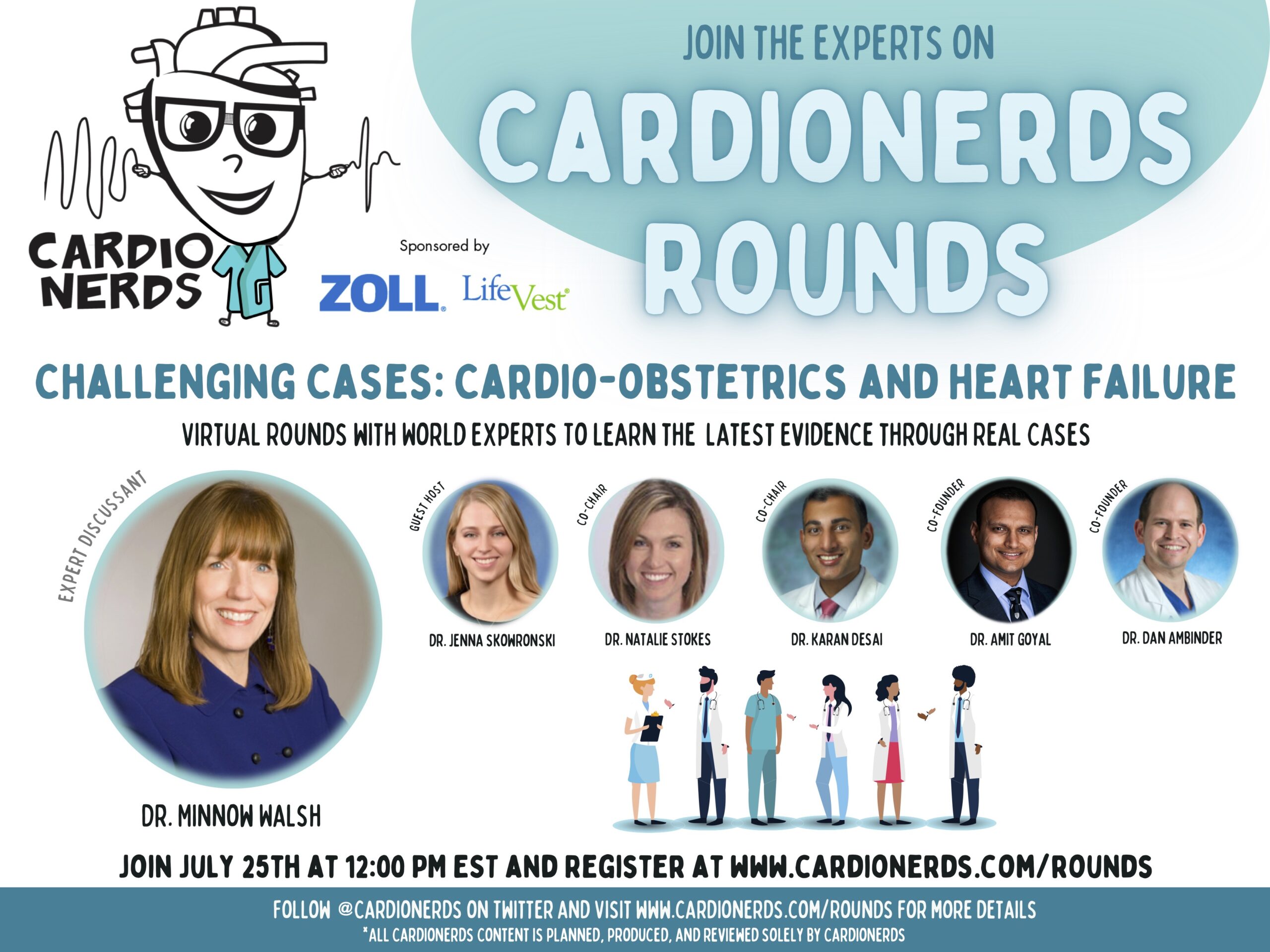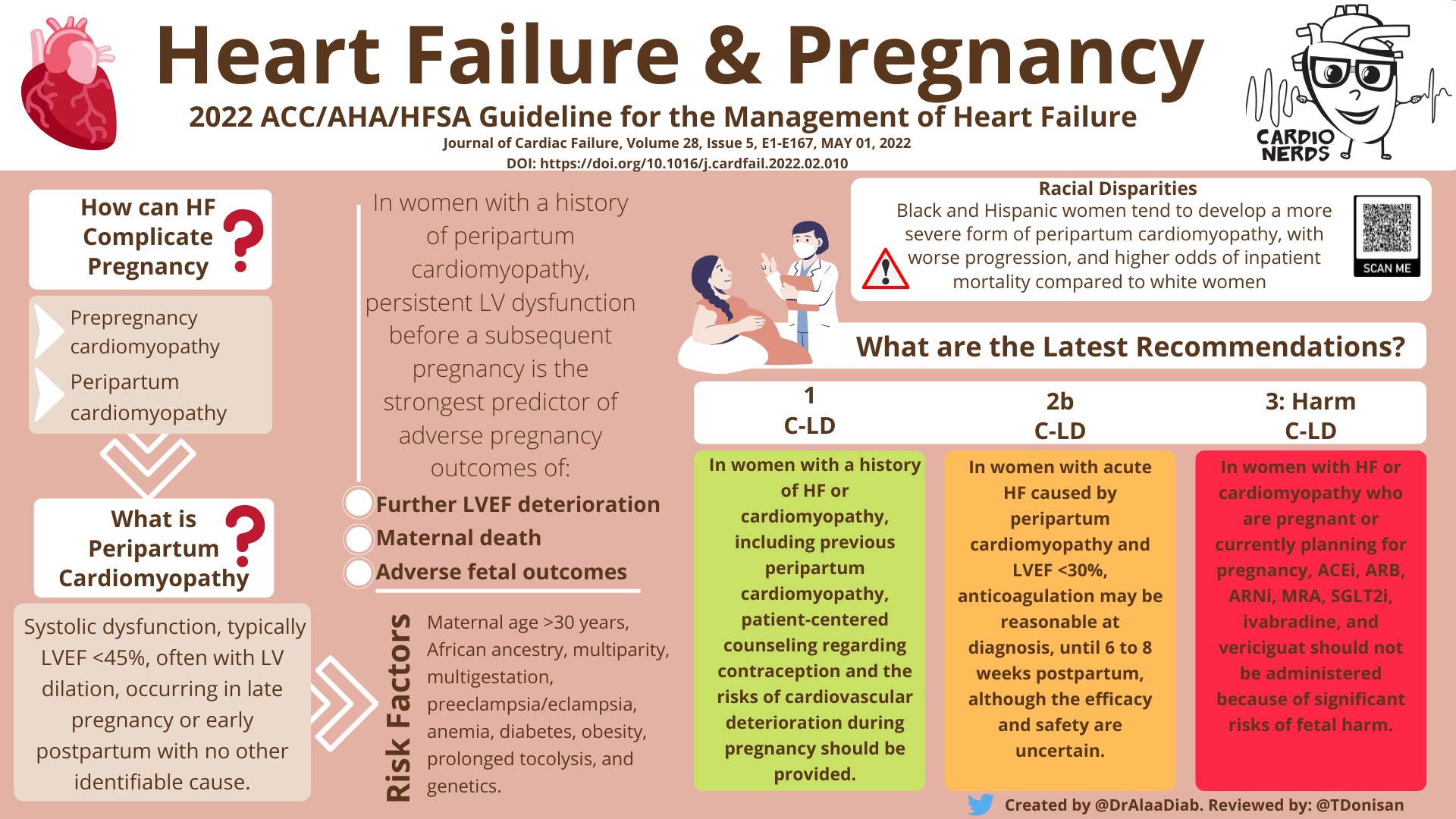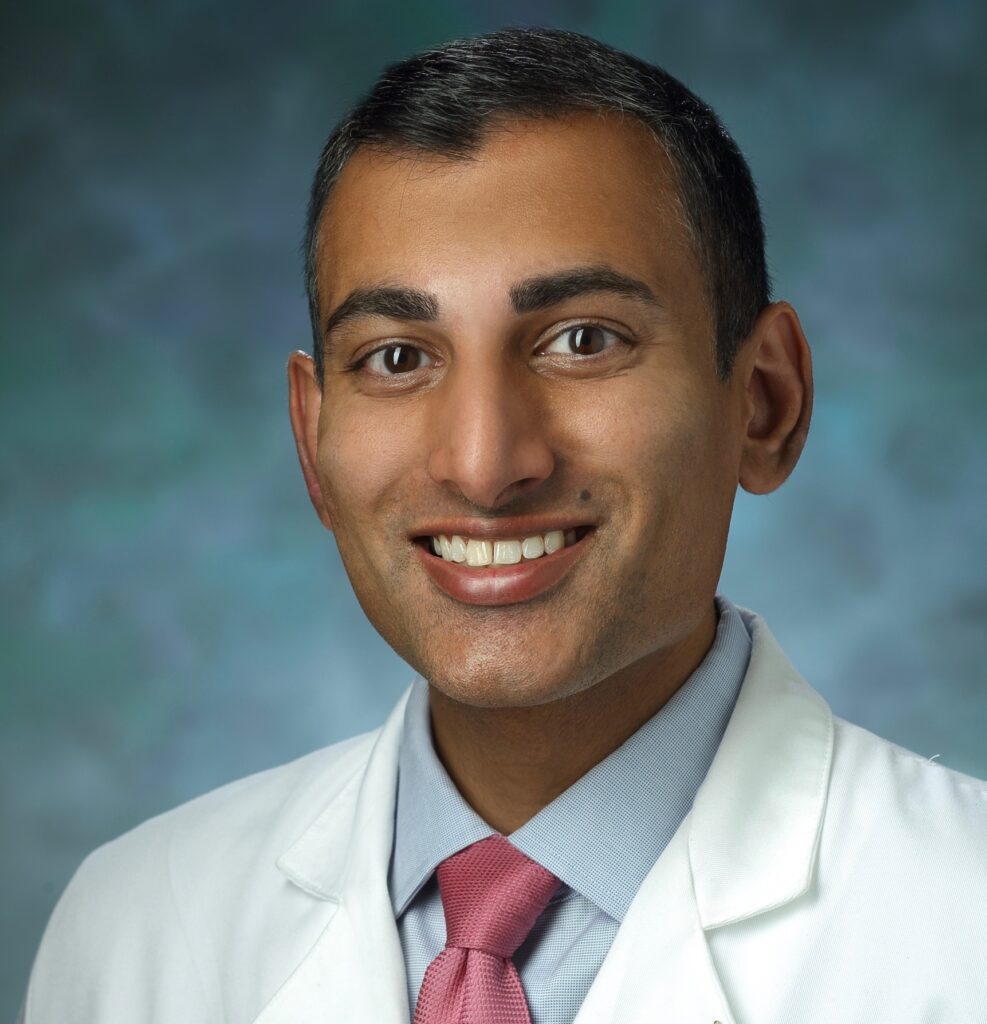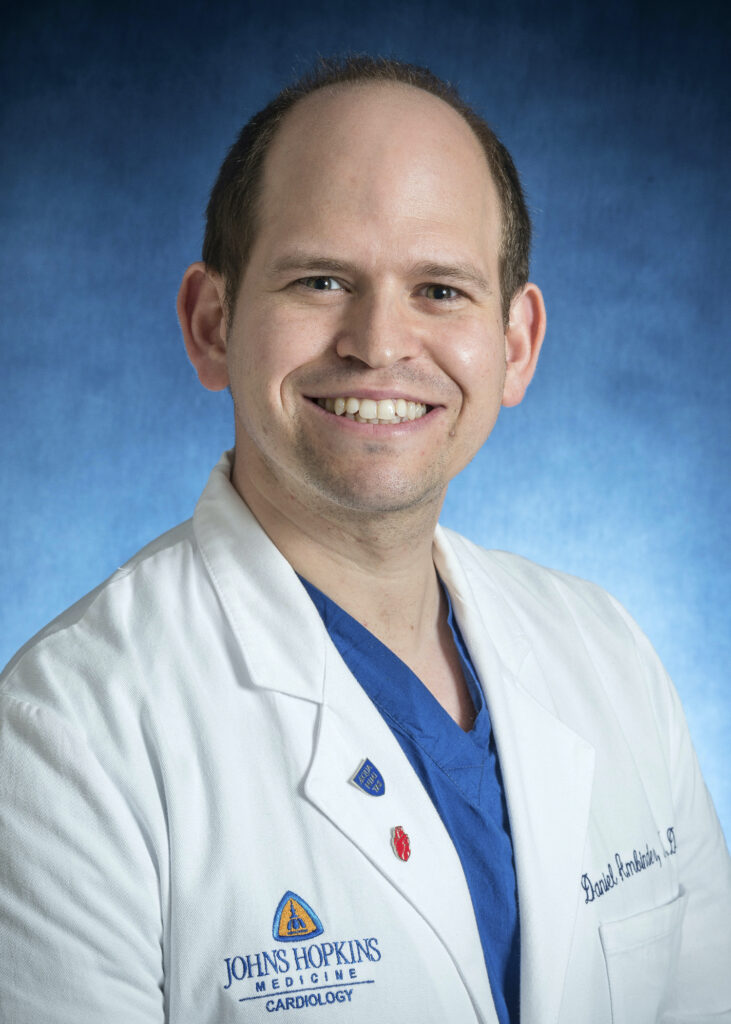Cardionerds: A Cardiology Podcast

283. CardioNerds Rounds: Challenging Cases – Cardio-Obstetrics and Heart Failure with Dr. Mary Norine (Minnow) Walsh
It’s another session of CardioNerds Rounds! In these rounds, Dr. Jenna Skowronski (Chief FIT at University of Pittsburgh) and Dr. Natalie Stokes (Formerly FIT at University of Pittsburgh and now General Cardiology Faculty at University of Pittsburgh) join transformational leader, educator and researcher, Dr. Mary Norine Walsh (Director of Heart Failure and Transplantation at Ascension St. Vincent Heart Center and Program Director of AHFT at St. Vincent) to discuss cardio-obstetrics and heart failure cases. Amongst her many accomplishments, Dr. Walsh is past president of the American College of Cardiology, Deputy Editor of JACC Case Reports, and a preeminent voice and thought leader in women’s cardiovascular health. Audio editing by CardioNerds academy intern, Pace Wetstein.
This episode is supported with unrestricted funding from Zoll LifeVest. A special thank you to Mitzy Applegate and Ivan Chevere for their production skills that help make CardioNerds Rounds such an amazing success. All CardioNerds content is planned, produced, and reviewed solely by CardioNerds. Case details are altered to protect patient health information. CardioNerds Rounds is co-chaired by Dr. Karan Desai and Dr. Natalie Stokes.

CardioNerds Rounds Page
CardioNerds Episode Page
CardioNerds Academy
Cardionerds Healy Honor Roll
CardioNerds Journal Club
Subscribe to The Heartbeat Newsletter!
Check out CardioNerds SWAG!
Become a CardioNerds Patron!
Show notes – Cardio-Obstetrics and Heart Failure
Case 1 Synopsis:
A woman in her earlier 30s, G1P1, with a history significant for peripartum cardiomyopathy presents to clinic for pre-conception counseling. Her prior pregnancy was in her late 20s with an uneventful pre-natal course and a spontaneous vaginal delivery at 37w2d. Two weeks after delivery, she experienced symptoms of heart failure and was found to have a new diagnosis of HFrEF. At that time TTE showed LVEF 30-35%, LVIDd 5.1cm (top normal size), diffuse hypokinesis. At that time, she was diuresed and discharged on metoprolol succinate 25mg po daily and furosemide 20mg po daily. She had one follow up visit 6 months postpartum and the furosemide was discontinued. Today in your office, she has NYHA Class I symptoms with no signs of symptoms of congestion. She walks daily and does vigorous exercise 1-2 times per week, while remaining on metoprolol. Repeat TTE with LVEF 45-50% and similar LV size. She would like to have another child and was referred to you for counseling.
Case 1 Rounding Pearls:
- Dr. Walsh discussed extensively the importance of full GDMT in this patient who was initially undertreated with only a beta blocker. If patients are breastfeeding, clinicians should consider the addition of ACE-Inhibitor and Spironolactone. Otherwise, if not breastfeeding, they should receive maximally tolerated doses of full GDMT. For more details on medical therapy for Heart Failure during pregnancy and after, refer to this previous CardioNerds Episode with Dr. Julie Damp.
- Patients with peripartum cardiomyopathy are at highest risk of worsening LV systolic function when they have persistent LV systolic dysfunction from their initial diagnosis. In this circumstance, shared decision making is paramount. These patients should receive counseling on contraception and risk of pregnancy on worsening LV function, death, & fetal demise. In addition, counseling includes discussing with patients limited options in some states for complete, comprehensive reproductive care, including pregnancy termination.
- If patients with prior peripartum cardiomyopathy do become pregnant, a team-based approach including cardiologists, maternal fetal medicine, and obstetrics (amongst other team members) is essential to determine care & delivery timing/method. These patients should also be examined for signs of decompensation throughout the pregnancy, including rales, S3 or a reported history of PND. For more about pregnancy physiology and signs of Heart Failure in pregnancy, refer to this previous episode with Dr. Garima Sharma.
Case 2 Synopsis:
A woman in her early 30s, G4P2022, with a history significant for polysubstance use disorder is transferred to your hospital POD #0 from an emergent C-section at 37w in cardiogenic shock. She presented to the local hospital with cough, dyspnea, and abdominal pain and urine toxicology was positive for methamphetamines. During evaluation she went into an SVT that was treated with metoprolol and was complicated by fetal decelerations. TTE showed LVEF 15%, LV dilation, and RV dysfunction. Given the fetal decelerations she had an emergent C-Section. We discussed her management as she progressed into SCAI Stage E Cardiogenic Shock.
Case 2 Rounding Pearls:
- The etiology of cardiomyopathy in this patient could be tachycardia induced, peripartum, toxic, or familial. A full evaluation is essential to determine if anything is reversible. SVT ablation could be considered if this was felt to be a driver.
- Approaches to durable mechanical circulatory support (MCS) such as a durable LVAD in patients with polysubstance use disorders are institution specific. Multidisciplinary input should be sought, including cardiology, cardiothoracic surgery, social work, nursing, nutrition, palliative care, and pharmacy.
- Consideration of temporary MCS as a bridge to transplant vs durable MCS should be considered again on a case-by-case basis, keeping in mind the current transplant allocation system that has made those patients with durable LVAD less likely to receive a transplant.
- We have previously discussed cases on the CardioNerds podcast that reflect this nuance. Consider listening again to these episodes from the CardioNerds team at Medical College Wisconsin and the University of Pennsylvania.
 Infographic by CardioNerds Academy Chief of House Jones (2023) Dr. Alaa Diab
Infographic by CardioNerds Academy Chief of House Jones (2023) Dr. Alaa DiabReferences – Cardio-Obstetrics and Heart Failure
- Bauersachs J, Arrigo M, Hilfiker-Kleiner D, et al. Current management of patients with severe acute peripartum cardiomyopathy: practical guidance from the Heart Failure Association of the European Society of Cardiology Study Group on peripartum cardiomyopathy. Eur J Heart Fail. 2016;18(9):1096-1105. doi:10.1002/ejhf.586
- Bauersachs J, König T, van der Meer P, et al. Pathophysiology, diagnosis and management of peripartum cardiomyopathy: a position statement from the Heart Failure Association of the European Society of Cardiology Study Group on peripartum cardiomyopathy. Eur J Heart Fail. 2019;21(7):827-843. doi:10.1002/ejhf.1493
- Davis MB, Arany Z, McNamara DM, Goland S, Elkayam U. Peripartum Cardiomyopathy: JACC State-of-the-Art Review. J Am Coll Cardiol. 2020;75(2):207-221. doi:10.1016/j.jacc.2019.11.014
- Writing Committee Members; ACC/AHA Joint Committee Members. 2022 AHA/ACC/HFSA Guideline for the Management of Heart Failure. J Card Fail. 2022;28(5):e1-e167. doi:10.1016/j.cardfail.2022.02.010
Production Team
 Karan Desai, MD
Karan Desai, MD Natalie Stokes, MD
Natalie Stokes, MD Amit Goyal, MD
Amit Goyal, MD Daniel Ambinder, MD
Daniel Ambinder, MD 





 Visit Podcast Website
Visit Podcast Website RSS Podcast Feed
RSS Podcast Feed Subscribe
Subscribe
 Add to MyCast
Add to MyCast